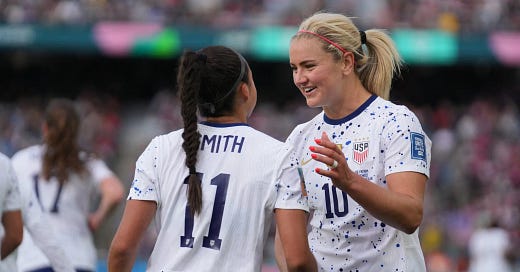It’s Official: Lindsey Horan, Sophia Smith, and Lynn Williams Have Changed Their Names
These USWNT stars built their names into legacies—so why change them now?
Lindsey Horan, Sophia Smith, and Lynn Williams have all officially changed their last names after getting married, marking a significant shift in how they’re known in the soccer world. Horan is now Lindsey Heaps, as noted in the SheBelieves Cup roster, Smith is now Sophia Wilson, and Williams, who recently joined Seattle Reign FC, is now Lynn Biyendolo.
Williams spoke about her decision on her podcast "The Women’s Game", saying a conversation with her father during their wedding dance helped her make the choice. He told her that adopting her husband’s name would be a way of honoring the new family she was building, which made her emotional and ultimately led to her decision.
I don’t know why they all made this choice, and I’m willing to bet they were all happy to do so—which is completely valid. But, I still find it disappointing. These are women who have spent years building their names, brands, and legacies in a sport that constantly fights for visibility, only to change those names at the peak of their careers.
And honestly? This feels personal to me.
I changed my last name when I got married. And when I got divorced, I had to change it back. It was a hassle, sure—but more than that, it made me realize that I wanted my name to represent me, not my partner. I hadn’t built a global legacy the way Horan, Smith, and Williams have, but even in my own life, it became clear that my name was mine—and I never wanted to change it again.
That’s why this stings a little.
Why It Matters to Keep Their Names
For more than a decade, Lindsey Horan, Sophia Smith, and Lynn Williams have been household names in women’s soccer. Their names are on jerseys, in record books, and part of the sport’s history. When an athlete reaches this level, their name is more than just personal—it’s a brand, a legacy, and a symbol of everything they’ve accomplished.
The Name They Built Matters
Changing names isn’t just about swapping out letters—it erases part of their public identity. Players like Mia Hamm, Abby Wambach, and Megan Rapinoe built their legacies under names that became synonymous with their impact on the sport. Had they changed them after marriage, would they have been as easily recognized in future generations?
Many women in sports and entertainment choose to keep their names professionally because they understand how crucial consistency is for their legacy. Serena Williams, Carli Lloyd, and Alex Morgan all married but kept their names in their professional careers, ensuring their contributions to their sports remained clearly tied to the identities they had spent years building.
The Patriarchal Pressure to Change
The tradition of taking a husband’s last name is deeply rooted in patriarchy, dating back to a time when women were seen as the property of their husbands. While times have changed, the expectation that women will change their names after marriage remains one of the most ingrained gender norms. Men in professional sports never face this dilemma—no one would expect Lionel Messi or LeBron James to change their names after marriage. So why is it still seen as the default for women?
Losing Recognition in Sports
For women’s sports—where media coverage, sponsorships, and fan engagement are already harder to come by—changing names can actually hurt brand recognition. Fans might not immediately recognize “Lindsey Heaps,” “Sophia Wilson,” or “Lynn Biyendolo” as the same athletes they’ve supported for years.
Name recognition is critical for endorsements, sponsorship deals, and post-career opportunities. In a sport where men already dominate marketing and financial opportunities, changing a well-established name only makes it easier for history to overlook these players' contributions.
A Choice, But A Powerful One
At the end of the day, Horan, Smith, and Williams have every right to make this decision. But just because something is personal doesn’t mean it’s free from larger social implications. In a world where women still fight for equal pay, equal recognition, and respect in sports, keeping their names isn’t just about personal identity—it’s about challenging outdated expectations and preserving their place in history.
No one should feel pressured to conform to an outdated norm, especially not the trailblazers in women’s soccer who have worked so hard to get here.
And for me? I just hope they never have to go through what I did—having to fight to reclaim a name that was always theirs to begin with.




